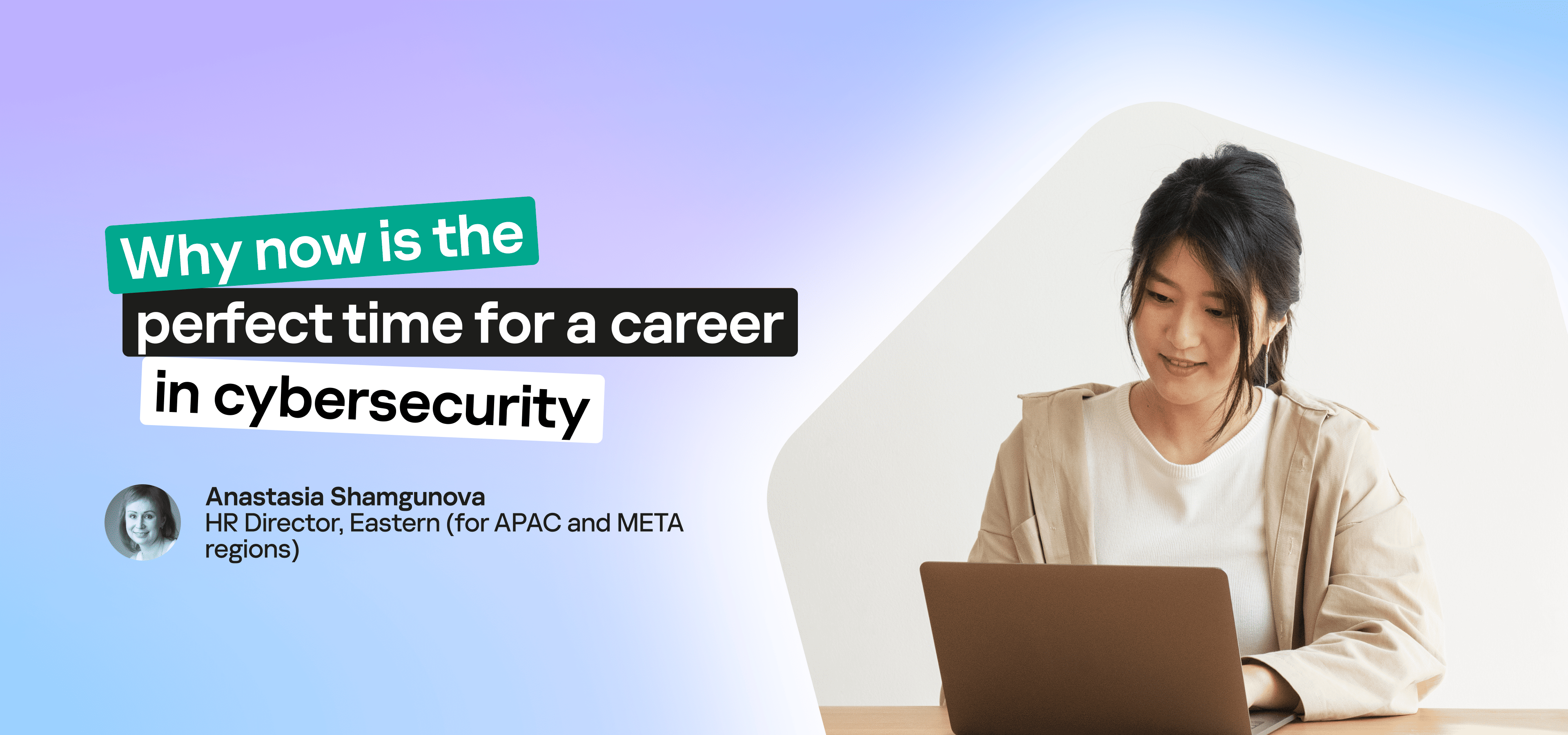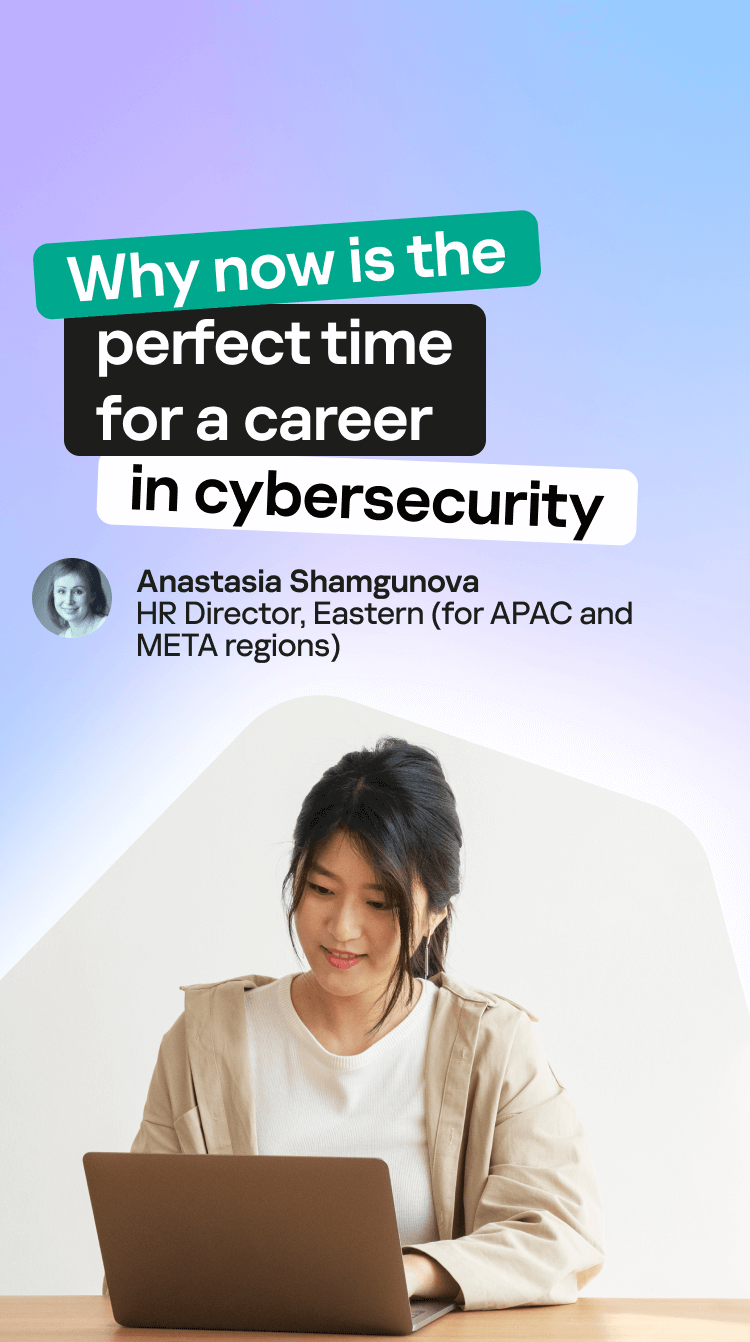


Anastasia Shamgunova, HR Director, Eastern (for APAC and META regions) at Kaspersky, has come a long way since joining the cybersecurity industry. However, she is now confident that cybersecurity is among the most promising areas for self-development and career-building because of the unparalleled pace at which the industry is changing.
Anastasia explains which candidate is a good fit for this field and the job opportunities that are trending in companies (spoiler: not only in tech positions!), and busts three common myths about employment.
Cybersecurity is for those who love drive
Before Kaspersky, I worked in the tobacco, automotive, and banking industries. Unfortunately, traditional large multinational companies limit your opportunities to shine. From my experience, there are guidelines for everything, and if there aren’t, you submit a request to the head office and wait for instructions – the whole process is slow. At Kaspersky, I can use my own initiative, figure out solutions or ask my colleagues for input. This is why I find working in cybersecurity exciting and rewarding.
I don’t know any other industry that is as thrilling. Something new happens every day: cybercriminals come up with more advanced malware, and we’re constantly trying to outpace them with our solutions and services. Whereas earlier malware could ruin a standalone computer, today’s it can paralyze critical infrastructure, such as hospitals, power plants, industrial facilities, delivery chains, and of course, banks. In every case, you cannot afford to take your eye off the ball or slow the pace — both figuratively and literally — so we have to act fast.
Because of its changeable and unpredictable landscape, our industry offers plenty of self-development and professional growth opportunities. For the same reasons, cybersecurity appeals to those who enjoy a dynamic lifestyle and prefer developing original concepts and making independent decisions to following strict guidelines. Of course, this comes with great responsibility because you never know what will work and what won’t: you’re the one blazing the trail. But isn’t that fascinating?
What jobs to pursue in cybersecurity
The industry offers two primary development paths. First, there are jobs for which a technology background and knowledge are required. You will most likely be working in departments, such as Research & Development, which includes threat research, analytics, products development and many other interesting areas. Cybersecurity also needs people for technical sales enablement and after-sales support, as well as those who can integrate the end product into the client company’s infrastructure and demonstrate how the client can achieve maximum performance and compatibility with other software. However, the industry has even more opportunities to offer: sales, marketing, finance, user support, and human resources management jobs where you can grow as a professional. These fields are equally important and exciting. The good news is that a tech background doesn’t strongly influence on what you do if you’re a solid professional in your field. Of course, industry specifics will have a big influence on your work because, as we’ve learned, cybersecurity is a very dynamic area. You have to be able to work at pace, adjust to changes, and be willing to develop and learn new things, even as an accountant, marketing specialist, or HR manager, to bring innovations to your work, supporting the business and becoming its true partner.
Three myths about employment and careers in cybersecurity
- The first and most common misconception is that you can’t succeed in cybersecurity without relevant experience.
As an HR professional, I’m not a fan of the conventional approach to hiring, which implies seeking new employees only in your company’s field. This is particularly true of non-technological positions. To my mind, hiring candidates with a different background has many advantages, including a broader outlook, new tools, and a fresh perspective. Crucially, you need to figure out what kind of job you want in cybersecurity and convey this to the interviewing HR specialist. They need to be sure that you’re on the same page and that the new job matches your ambitions. - The second myth concerns female applicants. Many are worried that cybersecurity is a predominantly male industry, and this can make them fear being rejected or facing difficulties when interacting with colleagues. However, prospective employers are more concerned with candidates’ talents and experience than their gender.
I believe this myth stems from limited knowledge of what cybersecurity has to offer. To remedy the situation, we should provide women with more opportunities to learn about the industry and its in-demand jobs. In addition, we must make sure nothing impedes women from getting an education and, of course, support them throughout the employment process. Kaspersky does its best to contribute because our company advocates for gender equality and is committed to creating a more diverse, more secure environment Kaspersky partners with NGOs to support women in the tech/IT industry. For instance, we cooperate with Advisory , a fully youth-led Singaporean nonprofit dedicated to empowering young Singaporeans to make informed career and further education choices. It gives us great pleasure to be part of their mentorship programs, participate in round tables, answer questions, and offer advice. We also partner and work with universities in the region to give lectures, hold topical events, and talk about careers in cybersecurity. Additionally, we offer workshops that teach young women the basics of cybersecurity. For example, in 2019, Kaspersky held seminars on cybersecurity for women in Jordan. Seminar participants also became familiar with the main types of cybercrime with the help of the KIPS (Kaspersky Interactive Protection Simulation) board game, which simulates a business environment exposed to cyberthreats.
I want to add that female professionals should be vocal about cases in which they experience a condescending attitude from their male peers. We don’t always notice that our jokes or actions can be offensive. In 90% of cases, a frank conversation solves the problem. The remaining 10% call for an appeal to the HR department or your immediate supervisor, who will ensure your colleague corrects his inappropriate behavior. - The third myth is that working in a technology company requires top-notch engineering and research skills, even if you’re in accounting or sales.
This couldn’t be further from the truth. Most importantly, you have to be a solid professional in your area and understand how your field is evolving, what trends are emerging, and how to harness them to perform better. Admittedly, understanding and accepting the specifics of cybersecurity and its many nuances is beneficial, but this comes naturally with experience.
Age is not a barrier
Careers in cybersecurity aren’t only for young professionals; you can join the industry later in life. To master a completely new profession, you have to be willing to start from scratch and learn a lot, but nothing is impossible. Modern IT companies have no age limits, so you could launch a new, successful career at any age — if that’s what you want. There are various opportunities for internal development in cybersecurity companies today, so you can start in one position, and use this chance to better understand how the industry works and what skills are needed to transfer to another professional field and make your dreams come true. Never stop learning, and you can achieve anything you want!